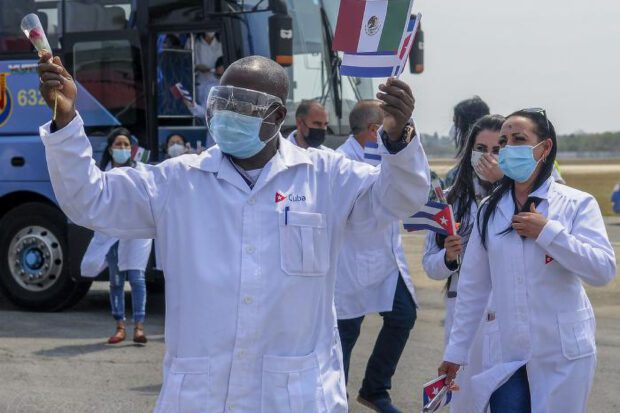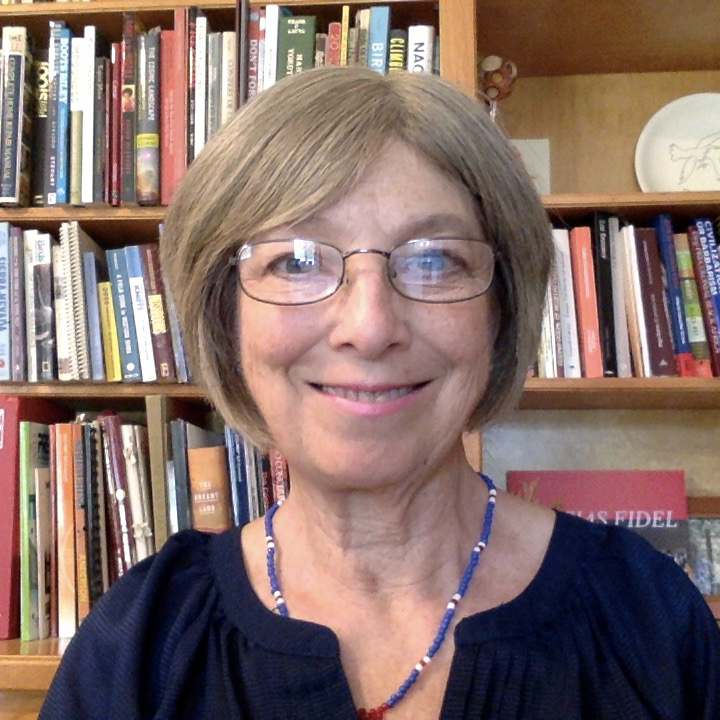
For many decades, Cuba has been sending thousands of medical professionals overseas to work in countries that needed doctors for a variety of reasons—post-colonial countries such as Algeria, Zimbabwe, Botswana or East Timor, for example, and countries suffering after natural disasters such as Pakistan, Indonesia, Peru, China, Chile, Nepal, Haiti and Ecuador after earthquakes, or from epidemics such as Liberia, Sierra Leone and Guinea during Ebola.
Everybody loves the Cuban doctors. And indeed it’s hard to think of a negative aspect to a country sending doctors internationally who will work in countries with insufficient healthcare and go to areas where private medicine, accustomed to urban settings and patients with money, will not go. It takes a special malicious inventiveness to find a way to attack this initiative.
Unfortunately, in the U.S. war on Cuba, that kind of malice is not lacking. It takes a special kind of cruelty, too, to try to force host countries to send their Cuban international medical workers home. The U.S. government has also done that.
In 2006, the George W. Bush administration created the Cuban Medical Professional Parole Program, which continued until 2017. This offered international Cuban medical professionals a guaranteed U.S. visa and a fast track to legal residence status if they would leave their jobs and patients. Some did, but not nearly enough to suit the U.S. government or to discredit the Cuban programs in any way.
Accusations of Human Trafficking
Beginning in 2019, U.S. Senator Marco Rubio (R–Fla.) and Secretary of State Michael Pompeo came up with a new idea: that Cuban internationalist medical workers are somehow victims of human trafficking. To countries that are poor and those in disaster situations, Cuba provides medical help free of charge. But for countries that can pay, the Cuban doctors are contracted for by the host government.
Not all the money goes to the medical personnel. Some of it goes back to Cuba to pay for medical education, which is free in Cuba, and funding the universal access health system, which is free in Cuba. Cuban doctors on international missions are paid more than they are paid in Cuba.
But the U.S. government is not content with putting Cuba on the (worst) Tier 3 Human Trafficking List (along with Nicaragua and Venezuela as the only others in the Américas). The United States has been threatening countries that invite Cuban doctors and nurses.
It takes a special cynicism to politicize the struggle to eliminate human trafficking in this way, and it’s more than a little bit disgusting. But what about the accusation that Cuban health workers are not volunteers?
John Kirk, a professor of Latin American Studies at Dalhousie University in Halifax, Canada, and the author and co-editor of 16 books on Cuba, interviewed 270 Cuban medical personnel and found the same things that this author has found in talking to people, in smaller numbers, who have been on internationalist missions. (Before Covid-19, this author spent about two and a half months each year in Cuba.)
It’s an economic opportunity, it’s an adventure, it’s a chance to contribute. People naturally have idealism and the desire to help, and Cuban education encourages this spirit. But no one is coerced; indeed, there are waiting lists, and a place in an international brigade is an honor as well as a chance to make some extra money.
“I have interviewed 270 Cuban doctors working on medical missions. I have never met a doctor who said they were exploited,” said Kirk. “This is just the U.S. obsession with bringing about regime change in Cuba.”
Kirk also says that “it is morally reprehensible for the United States…to try to stop medical services being provided to other countries.”
New York Times Cozies Up to Trump
Recently, a New York Times article critical of the Cuban international medical programs was published, apparently in support of the Trump regime’s attempt to make sure that Cuban doctors, nurses and other medical workers cannot work in other countries. Trump’s (and Rubio’s) attack on the Cuban international medical program starts with the demonstrably false accusation that Cuban medical workers are being trafficked rather than being professionals who volunteer to work on contract overseas, getting paid according to a previously agreed contract.
The writer, Frances Robles, did not include a single interview or quote from a Cuban medical worker currently serving on a mission. Instead, she limited her primary sources to two well-known critics of Cuba’s international health programs. The first, Maria Werlau, is the hardline founder of a U.S. government–funded organization called Cuba Archive (also known as the Free Society Project). The second is Ramona Matos, a former doctor living in South Florida who has been the poster child for the campaign against the medical missions.
Robles apparently interviewed Carlos Fernandez de Cossío, Cuba’s deputy minister of foreign relations, but decided to leave out his answers. Here’s that interview, hidden from readers of the New York Times, but available to you as a Community Alliance reader:
Q. (Robles) What are the most serious consequences of the hardening of policies related to Cuba by the Trump administration? I also ask myself if there are current discussions between the Cuban government and the Trump administration about relaxing some of these sanctions, migration and other affairs.
A. (Fernandez de Cossío) The policies of the Trump administration, as defined by those in charge of these within the government, seek to strangle the Cuban economy through threats and coercion directed at governments and entities (organizations and businesses) of third countries, thus reinforcing the siege that they have imposed during decades.
The consequences are tangible, with growing difficulties in gaining access to international banking agencies, finding providers for supplies and technology that are necessary for the economy, ensuring the fuel supply, and finding markets for Cuban exports, including tourism.
As was to be expected, this has affected the living standards of our population, restricting income and damaging essential services such as electricity, water, transportation and medical services. It has changed the macroeconomic balances and placed obstacles in the path of growth and development.
There have been no bilateral policy talks.
Q. Has any country already notified the Cuban government of their desire to withdraw from an agreement regarding Cuban medical brigades, due to the new Trump measures?
A. Countries that have relied on Cuban medical brigades have varied over the years. None of the countries with which we currently have bilateral health system cooperation have expressed the desire that we leave their territory.
Q. Many people contend that the Cuban medical brigades constitute “human trafficking.” Clearly, the Cuban government disagrees. What are the criteria in international law that demonstrate that the program does not constitute human trafficking?
A. This is a falsehood without foundation. None of the characteristics internationally recognized as human trafficking apply to this activity. The Cuban professionals who participate do so voluntarily. They know where they are going, they have complete freedom of movement, they receive their whole salary and accumulate pension contributions in Cuba while they lend their services in other countries. Furthermore, they receive a salary appropriate for the country in which they are working, often larger than the salary that they already receive.
Their living expenses, transportation and, often, food are also covered. On occasion, the Cuban authorities of the public health system receive compensation for these services, based on bilateral intergovernmental agreements that are absolutely in keeping with Global South-South cooperation practices recognized by the United Nations and consistent with activities developed by numerous organizations, private and governmental international institutions that manage and offer professional services anywhere in the world.
The fundamental difference lies in the broad reach, the number of countries and services offered and the habitual willingness to take these services to remote communities where others are not prepared to go.
Latin America and the Caribbean Say No to U.S. Coercion
In March, the CARICOM countries (the Caribbean Community; a collective of Caribbean nations and dependencies that work together) asserted their sovereignty and rejected the U.S. government attacks on their right to have Cuban medical workers in their countries helping care for people who otherwise would have no medical care.
In April, the heads of state of many of the 35 countries of CELAC (Community of Latin American and Caribbean States) met at Tegucigalpa, Honduras, and—despite the opposition of the right-wing governments of Argentina and Paraguay—reaffirmed Latin America and the Caribbean as “‘a Zone of Peace’ adhering to the principles of the UN Charter, International Law, democracy, multilateralism, human rights, self-determination of countries, sovereignty and territorial integrity.”
They rejected “unilateral coercive measures, contrary to international law, including those of a commercial nature.” Mexican President Claudia Sheinbaum put it clearly: “We reject, as Mexico has historically done, trade sanctions and blockades. No to the blockade of Cuba. No to the blockade of Venezuela.”
Sheinbaum also addressed the issue of immigration and the need to “cooperate in addressing human mobility from a humanistic perspective.”
“Our historical position has been that the most humane and most successful way is to address the structural causes of inequality, unemployment and violence that drive migration,” Sheinbaum said. “We reject racism, classism, the violation of human rights and the criminalization of our brothers and sisters on our continent who, for whatever reason, have had to migrate north.”
At Tegucigalpa, Dr. Luther Castillo Harry, secretary of state for science and technology of Honduras, also delivered a message. Dr. Castillo is a member of the first graduating class of the Latin American School of Medicine (ELAM). “Today, there is no doubt in the world about the technical, scientific and human capacity of Cuban healthcare professionals, and ELAM now has a worldwide brotherhood of more than 31,000 doctors in 122 countries,” he stated.
“The altruism that characterizes this healthcare professional, unconditional and willing to give his life for his patient, constitutes a fundamental element that our enemies are deeply afraid of. They know us so well that they go to the trouble of inventing fallacies, all in an attempt to discredit something they themselves are clear about.”
And Cuban President Miguel Díaz-Canel declared that “Cuban doctors are the pride of the nation and of many nations around the world. The maneuvers of [Secretary of State] Marco Rubio and [Special Envoy of the State Department for Latin America Mauricio] Claver-Carone, and the lies of those who serve their criminal plans, will crash against that formidable wall of dignity and proven professionalism; just as the invaders of Playa Girón (Bay of Pigs) crashed against Cuban heroism in 1961.”

